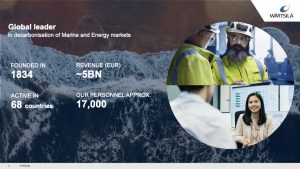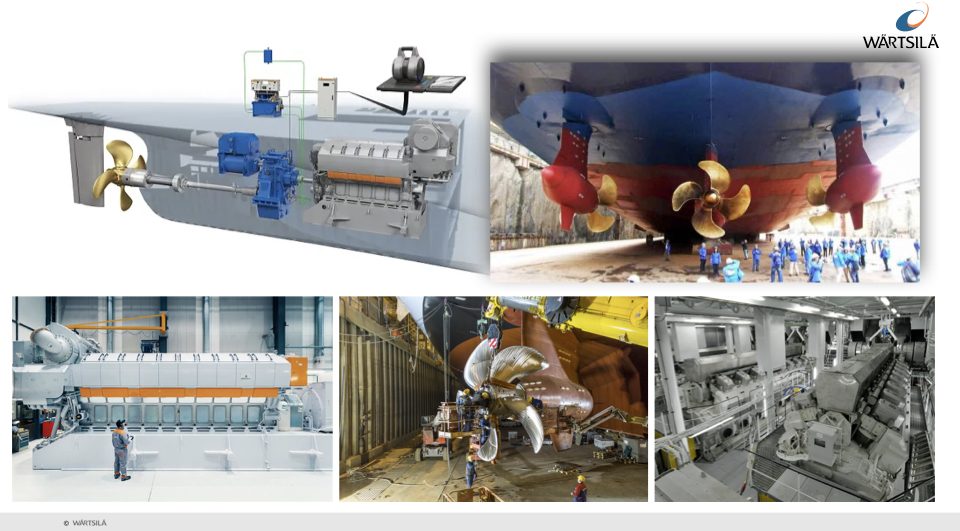- COMPANY
Wärtsilä ( https://www.wartsila.com/ )
- SEMINAR’s focus
To design a ground breaking vessel’s energy consumption calculator to support decision making when buying fuel, which has different quality values. (LHV = Lower heating value)
- DESCRIPTION
Wärtsilä is a global leader in innovative technologies and lifecycle solutions for the marine and energy markets. We emphasise innovation in sustainable technology and services to help our customers continuously improve environmental and economic performance. Our dedicated and passionate team of 17,800 professionals in more than 280 locations in 79 countries shape the decarbonisation transformation of our industries across the globe.  In 2023, Wärtsilä’s net sales totalled EUR 6.0 billion. Wärtsilä is listed on Nasdaq Helsinki.
In 2023, Wärtsilä’s net sales totalled EUR 6.0 billion. Wärtsilä is listed on Nasdaq Helsinki.
Wärtsilä purpose is to enable sustainable societies through innovation in technology and services
Wärtsilä businesses include:
- Wärtsilä Energy helps our customers in decarbonisation by developing market-leading technologies. These cover future-fuel enabled balancing power plants, hybrid solutions, energy storage and optimisation technology, including the GEMS energy management platform.
- Wärtsilä Marine’s broad portfolio of engines, digital technologies, propulsion systems, hybrid technology, and integrated powertrain systems delivers efficiency, reliability, safety, and environmental performance. Wärtsilä Marine also supports customers with lifecycle services related to exhaust treatment, shaft line, and underwater repair.
- In addition, Wärtsilä Portfolio Business consists of business units, which are run independently to accelerate performance improvement and unlock value through divestments or other strategic alternatives.
- CHALLENGE:
Background
We are living in the era to embrace and migrate to green technologies with the aim to address diverse aspects of sustainability. Maritime industry is working and developing green technologies, however it must be acknowledged that 95% of current vessels navigating worldwide are functioning with fuel. The transition to other types of energy within the marine industry will take time.
Currently, there are different visions and suggestions on how to reduce the emission from the shipping sector. One concrete action is the EU initiative to add a carbon tax to the emissions (see: https://climate.ec.europa.eu/eu-action/transport/reducing-emissions-shipping-sector_en ) While the discussion about the new tax takes place among policy makers, industry started to explore tools , which can be offered to decision makers, to gain awareness about the amount of CO2 their vessels are producing due to the type of fuel they are burning. Wärtsilä is a be front runner in the efforts to create such tools.
In the seminar session the focus is on vessel’s energy consumption calculator, in other words: during the seminar we aim to conceptualize a tool that enables end users (who might not have any engineering knowledge) to gain awareness of the type of fuel the vessel contains and utilizes. It is important to notice that: (i) we are not teaching the end-user, but supporting them in their decision process, (ii) the tool does not concentrate on the vessel’s engine but on the energy content of the fuel, i.e. the amount of heat that is produced by the burning of the fuel.
Context:
Vessels buy different quality types of fuel. Often the purchases are in the low end of the scale in fuel quality, e.g. waste fuel. The less quality the fuel has the less energy content it contains, however it is cheaper in the market.
Currently, end user based the purchase decision of the fuel they will buy, to fill a vessel’s tank, base on money. The cheaper the fuel, the less money the owner of the vessel will pay for that combustible and the user assumes the decision “saves” cash. It is important to stress that the amount of these type of purchases are in the range of millions of dollars (see: https://casualnavigation.com/how-much-does-it-cost-to-refuel-a-cargo-ship-a-lot/ ). Hence, if an owner of the vessel save a million, for example, from purchasing a cheaper fuel, he or she might take that option from the market. However, the decision is only based on how much the fuel costs without understanding that the cheaper the is the price of the fuel the lower quality it has and therefore generates other costs due to the low quality, e.g.: higher pollution, lower energy content, erodes the life of the technology, etc. Cheaper is expensive.
To understand the real cost of buying different fuel qualities for a vessel is important. Vessels’ owners must have a holistic view in the cost of different fuel qualities, including how much they will pay for the pollution they generate from buying less quality fuel, how much energy they will produce with different fuel qualities etc. It is needed a user friendly tool to help decision makers, who purchase the vessel’s fuel, to have a more informed and holistic view of what they are buying. The tool needs to offer simple information and easy visualization of the real costs offered by each possible quality fuel type.
In our session we will conceptualize a vessel’s energy consumption calculator to support vessel’s operators and decision makers judgement of which quality fuel to purchase by informing them of the implications and costs to buy different type of fuel options. The calculator should support to make an informed decision with a better understanding of the real costs and benefits to the different quality fuels, the energy content implications, the pollution costs and savings of taking care of the vessel’s technology. Thus, some of the topics and information that should be included in the calculator, to offer a “holistic” view of the costs of each fuel type, include to answer the following questions:
- How do we know the amount of energy content and its benefits for our vessels when buying a particular fuel quality?
- According to the fuel quality, we have different energy content and levels of pollution, then how can we visualize the real price of paying certain fuel quality if we also take into account the pollution tax and the energy content of the fuel?
- How can we detect the “providers” who often sell the worst quality fuel to vessels? And inform other vessels about these “dangerous” providers?
- How does the calculator, as a tool, could improve the quality of the fuel consumption by vessels while supporting their business?
- How to design a vessel’s energy consumption calculator as a user friendly tool, while at the same time be effective?
- How can we enable the tool offer reports for different stakeholders? Get the reports but would be tool that will prevent them of this (bad suppliers, bad batches, etc. )
Last but not least, in the vision of a vessel’s energy consumption calculator, how can it involved the knowledge transfer of the transition to other energy sources addressing not only the economical savings but also a greener path in the utilization of energy.
Tasks for the session
- Discuss the content of the vessel’s energy consumption calculator to support decision making while purchasing fuel for a vessel.
- Find out the critical information to be presented to different stakeholders when buying fuel
- Find ideas how to present the information of purchasing different types of fuel for vessels, and later to biodiesel, gas and other types of energy (note: looking to use very low sulphur fuel)
- Find ideas for how the tools could be utilized
Outcome
- Idea for the design of a ground breaking vessel’s energy consumption calculator (including its requirements, key aspects, etc.) that supports the decision making of what fuel type to purchase among the different quality values (LHV = Lower heating value) offered in the market.
- Action points for the development of the vessel’s energy consumption calculator
- DAY and TIME
Thursday March 14th from 12 to 16hrs.
- SEMINAR LOCATION and TENTATIVE SCHEDULE:
Wärstsilä facilities Joukahaisenkatu 9C
- ENROLLMENT
Please enroll to the seminar session by filling the following form: https://link.webropol.com/ep/wartsila
The enrollment closes on Monday March 11th.
- PRE ASSIGNMENT
To prepare ourselves and enrich our conversation during our Industrial Seminar session with Wärtsilä, we should prepare ourselves by working on the pre-assignment three tasks. Please submit the report of your pre-assignment by Tuesday March 12th.
You can find the instructions of the pre-assignment following this link.
